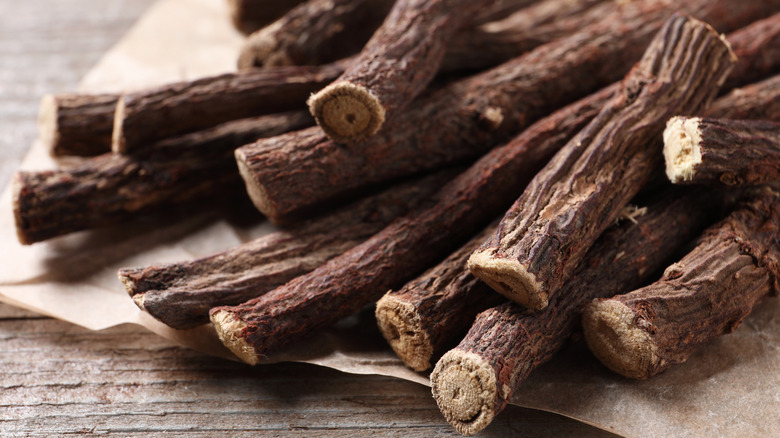Does Licorice Tea Help Reduce Menopausal Hot Flashes?
Although menopause is the time when a woman has gone a year without a period, perimenopause can often bring uncomfortable symptoms. These may include insomnia, painful intercourse, mood changes, and hot flashes as the body prepares for menopause, according to the National Institute on Aging. Perimenopause symptoms can be treated through hormone therapy, vaginal estrogen, and antidepressants (via Mayo Clinic). Gabapentin, a seizure medication, can help with hot flashes for those whose personal and family history might limit the use of hormone replacement therapy.
Those who experience hot flashes might consider licorice. A 2017 study in Steroids found that licorice root (not the candy) acts like a low-potency estrogen receptor. It can be an option for women who don't want to take hormone replacement therapy. A 2013 study in Health Care for Women International compared licorice root to hormone replacement therapy on how well they treated hot flashes. One group took 1140 milligrams a day while the other group took a hormone replacement. Although both reduced the frequency and duration of hot flashes, hormone replacement therapy reduced their severity. Licorice did a better job of reducing the duration of hot flashes. A 2012 study in the Iranian Journal of Pharmaceutical Research had women taking 330-milligram licorice root capsules three times a day for eight weeks. Compared to a placebo, the licorice reduced the frequency and severity of hot flashes. Note, however, that these studies didn't use licorice tea.
Licorice can have adverse effects
The active ingredient in licorice is glycyrrhizin, which gives it that sweet taste (via Healthline). Although glycyrrhizin gives licorice its antioxidant, anti-inflammatory, and antimicrobial benefits, it can increase cortisol levels and cause a fluid imbalance in your body. Licorice root can also lower your potassium levels, cause muscle weakness, and affect your heart's normal rhythm.
Licorice could also cause high blood pressure, according to a 2015 study in BMJ Case Reports. A 45-year-old woman with perimenopause symptoms was drinking six cups of licorice tea a day and had unusually high blood pressure. Her blood pressure went back to normal after she stopped drinking the tea.
According to a 2017 presentation to the American Chemical Society, licorice root supplements can interfere with medications. A press release about the study said that three types of licorice affected enzymes in the liver that can affect how quickly medications are processed. Specifically, licorice interferes with blood pressure medications, cholesterol medications, diuretics, estrogen-based contraceptives, and anti-inflammatories (via Healthline).


